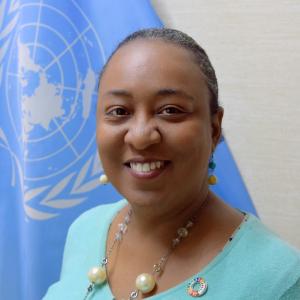The Government of Jamaica signed on to the first combined United Nations (UN) Programme for the English and Dutch-speaking Caribbean on Thursday (January 19th), signaling its support of the new five year development package and endorsing its strong emphasis on improving people’s lives.
Minister of Foreign Affairs and Foreign Trade, Senator the Hon. Kamina Johnson Smith signed the US$197 million Multi-country Sustainable Development Framework (UN MSDF) on behalf of the Government of Jamaica, in the second of 18 official signing ceremonies to be scheduled across the region. UN Resident Coordinator, Mr. Bruno Pouezat signed on behalf of the 23-strong UN Country Team (UNCT) of Jamaica. The signing ceremony and launch took place at the Spanish Court Hotel in Jamaica’s capital city Kingston, witnessed by Government officials, the diplomatic and international donor partner community and civil society representatives.
“Jamaica particularly welcomes the fact that the UN MSDF provides a common platform for development cooperation, which is strongly rooted and linked to national priorities and our own national development plan, Vision 2030. Further, we are also pleased that the UN MSDF will be anchored in the CARICOM Strategic Plan for 2015-2019,” Senator Johnson Smith said.
She noted that in order to maximize the impact of development efforts in the region, a more integrated and sustainable mechanism is required and that this is best served by the UN MSDF’s multi-country approach. “The UN MSDF, therefore, presents itself as the most suitable instrument to address these common and inter-related development issues at both the regional and national levels over the next five years”, Senator Johnson Smith acknowledged.
UN Resident Coordinator Mr. Pouezat in pointing out the benefits of this new regional arrangement to Jamaica highlighted the decreased administrative burden on the Government; a more coherent UN response to national challenges, needs, and priorities; easier access to the full range of UN expertise and resources across the region – not just nationally.
“From a cost perspective, the MSDF leverages a regional resource mobilization strategy, increases efficiency, and decreases transaction costs. And doing more with less matters, as development resources continue dwindling across the globe and the region,” he said. Mr. Pouezat also noted that other benefits for the Caribbean are likely to be derived from sustained regional and national impact through synergies at the regional level, helping meet the converging efforts of Caribbean countries and enhancing regional integration while localizing action on the Sustainable Development Goals (SDGs).
Mr. Pouezat acknowledged the Planning Institute of Jamaica and the Ministry of Foreign Affairs and Foreign Trade for what he called their outstanding leadership in the development of the regional programme.
In Jamaica, the UN MSDF programme will be coordinated by a Joint National/United Nations Steering Committee (JNSC) established under the leadership of the Government of Jamaica and the United Nations Resident Coordinator (UN RC). Existing Thematic Working Groups (TWGs) of Jamaica’s Vision 2030 will strengthen collaboration and results on the Jamaica programme.
The four main priority areas of the programme are:
1. An inclusive, equitable and prosperous Caribbean
2. A Healthy Caribbean
3. A Safe, Cohesive and Just Caribbean
4. A Sustainable and Resilient Caribbean
The five-year package of technical and financial assistance to Jamaica will focus on Education, Health, Security and Justice, as well as Environment, Ecosystems, Renewable Energy and Sustainable Societies. Jamaica will implement the regional UN MSDF guided by annual Country Implementation Plans (CIPs).


















